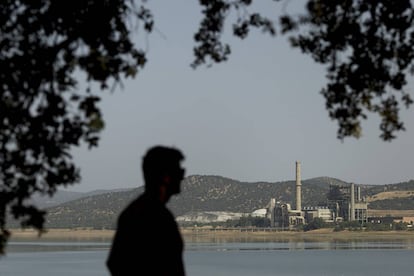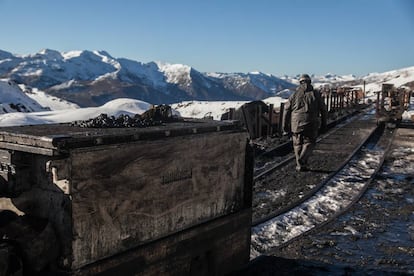Spain to close half its coal-fired power stations
The country is on track to becoming one of the world's fastest decarbonizing nations


Spain is on track to become a coal-free country in record time. All of its remaining coal-fired thermal power plants will start shutting down on Tuesday, a year-and-a-half after the closure of the coal mines, which could not survive without the state aid that the European Union has banned.
Seven out of the 15 coal-fired power stations that are still working in Spain will cease being operational on June 30, after their owners – the electricity companies – decided that it does not make financial sense to adapt them to European regulations. And four more are getting ready to shut down soon.
Yet these closures appear to have little to do with the Spanish government’s policies. As a matter of fact, the Ministry for Ecological Transition has refused to join an alliance of countries pledging to set a fixed date for phasing out this type of facility. Instead it was the market itself, together with the measures coming out of Brussels, that sounded the death knell for coal.
Several of these power stations have not been producing electricity for months because it is no longer profitable due to a combination of market conditions and political decisions by the European Commission, which is the executive branch of the EU.

Until just a couple of years ago, these highly contaminating plants were accounting for approximately 15% of all greenhouse gas emissions in Spain. In 2018, nearly 15% of all electricity consumed in Spain came from coal-fired thermal stations.
But that seems like an eternity ago. In May of this year, coal-fired plants barely contributed 1.4% to the power mix. And they produced nothing at all between May 1 and 2, for the first time since Red Eléctrica de España (REE), the national power grid operator, began keeping records in 1990.
The seven coal-fired thermal plants that will be phased out on Tuesday are Meirama in A Coruña, Narcea in Asturias, La Robla and Compostilla in León, Andorra in Teruel, Puente Nuevo in Córdoba and Velilla in Palencia.
The four companies that own them – Naturgy, Endesa, Viesgo and Iberdrola – have confirmed to EL PAÍS that they will cease operations on June 30 to avoid violating a European environmental directive forcing such plants to adopt technology to clean up the gases they emit.
A year ago there were still a few skeptics out there, but after the movements we’ve seen, I think that there is no going back to coal for SpainPedro Linares, Economics for Energy
Together, these seven plants represent 4,630 megawatts (MW), a little less than half the installed coal power generation capacity in Spain. They provide around 1,100 jobs, including direct employees and outsourced work.
Four other plants accounting for 3,092 MW and employing around 800 workers have already filed for permission to shut down. Industry sources estimated that Iberdrola’s Lada plant in Asturias, Endesa’s As Pontes plant in A Coruña and Litoral plant in Almería, and Los Barrios in Cádiz could be closed by 2021 or 2022.
There are four other coal power plants in Spain that have not yet applied for closure, although their future seems uncertain.
“The way things are going, I think there will no longer be any coal generation by 2025,” said Tatiana Nuño, an energy and climate change specialist at environmental NGO Greenpeace. “The scenario we are working with for complete closure is 2025,” agreed Ana Barreira, director of the International Law and Environment Institute (IIDMA). Industry sources believe the phase-out could happen even faster, in two to three years.
On one hand, EU reforms drove up the price of CO2 in the European market. The EU emissions trading system set a price for releasing carbon dioxide that was high enough to discourage the use of this fossil fuel. During 2019, the price of a ton of CO2 was €25, meaning that in many European countries coal-fired electricity is not as profitable as other options such as natural gas or renewable energy.
Adding to this is the low price of natural gas since 2019. Spain has many combined-cycle plants that use gas and can easily replace the coal-powered plants. “The price [of gas] went down because there was an excess of global supply and no place to store it,” noted Pedro Linares, director of the Economics for Energy group.
The forecast for 2020 was that the price of gas would rise and make coal more competitive again. But the Covid-19 pandemic disrupted that scenario as well. As a result, coal plants have been producing electricity at historical lows since March 2019. At least four – Compostilla, Litoral, Los Barrios and Velilla – have produced nothing this year, according to their owners. And the others have been burning their remaining stock before calling it quits tomorrow.
What analysts seem most surprised about is the speed of the process in Spain. “I think that the disinvestment movements have also played a role,” said Barreira of IIDMA, alluding to pressure from investment funds asking companies to ditch fossil fuels. Linares, of Economics for Energy, agreed. “A year ago there were still a few skeptics out there, but after the movements we’ve seen, I think that there is no going back to coal for Spain.”
Job alternatives
The immediate alternative is dismantling the plants, a process that can take up to five years and requires a lot of manpower. But this cannot begin until the executive officially publishes its authorization in the State Gazette (BOE), and this in turn requires an environmental impact analysis. The BOE is expected to publish the required information in the coming days for three plants due to shut down tomorrow: Velilla, Compostilla and Andorra.
The ministry has also been pressuring electricity companies to come up with stable plans for affected areas. Many of the proposed projects involve renewable energy and some would require more workers than those who will be laid off by the coal plant closures. In mid-April, the ministry signed a deal with the majority unions and the plant owners to introduce so-called fair transition agreements. There are 12 such agreements underway in mining and coal plant areas. The government has assigned public resources to fund these initiatives, and Spain is expected to benefit from a future Just Transition Mechanism from the European Commission.
English version by Susana Urra.
Tu suscripción se está usando en otro dispositivo
¿Quieres añadir otro usuario a tu suscripción?
Si continúas leyendo en este dispositivo, no se podrá leer en el otro.
FlechaTu suscripción se está usando en otro dispositivo y solo puedes acceder a EL PAÍS desde un dispositivo a la vez.
Si quieres compartir tu cuenta, cambia tu suscripción a la modalidad Premium, así podrás añadir otro usuario. Cada uno accederá con su propia cuenta de email, lo que os permitirá personalizar vuestra experiencia en EL PAÍS.
¿Tienes una suscripción de empresa? Accede aquí para contratar más cuentas.
En el caso de no saber quién está usando tu cuenta, te recomendamos cambiar tu contraseña aquí.
Si decides continuar compartiendo tu cuenta, este mensaje se mostrará en tu dispositivo y en el de la otra persona que está usando tu cuenta de forma indefinida, afectando a tu experiencia de lectura. Puedes consultar aquí los términos y condiciones de la suscripción digital.








































